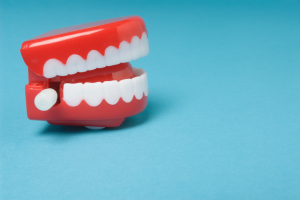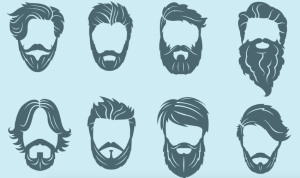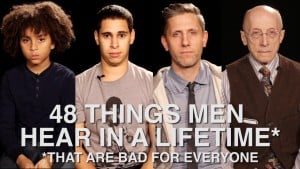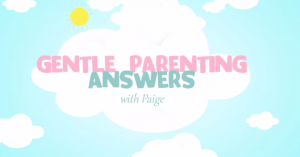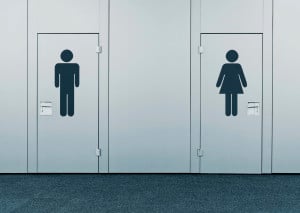(Content Warnings: childhood abuse and neglect)
As mentioned in a recent article of mine, there’s a video from the Canadian campaign Humans for Humans in which their intention was to spread empathy and awareness for the homeless population by recording homeless individuals reading mean tweets about themselves.
I’m not going to go on again about why this video was unfortunately problematic, but I do want to point out one tweet in particular: “Maybe if homeless people took care of themselves to look pretty, we would want to help them. I don’t help yellow teeth.”
What?
WHAT?!
WHAAAAAAT?!
Tooth shaming is something that happens far too often in this grand country of ours – and it’s not talked about nearly enough, considering how classist it is.
This sort of social antagonism and ridicule is introduced early on in many people’s lives – and get’s validated under the supposed context of health.
I mean, take a look at how children’s programming sends the message that “healthy” teeth and “white, straight” teeth are not only the same thing, but directly connected to personal hygiene.
Kids with less-than-perfect teeth (and other looksism situations) are taught that they’ll have no friends if they’re—well—less than “perfect.”
Likewise, kids with white, straight teeth (or lacking in other looksism situations) are sent the message that it’s okay to ignore, tease, or bully kids who don’t fit the mold.
And it’s not just an issue of childhood bullying.
Adults feel it just as much, especially in work environments.
While peers may judge them behind their backs and question their abilities to raise their children or perform well at work, managers have been known to limit less-than-perfect toothed workers to tasks that don’t require them to work with the public.
Instead of working the register, they can end up in the stock room purely because the company feels their teeth don’t represent the picture-eque image the company wants attached to them – not to mention that getting a job can be just as difficult for these same exact reasons.
Because of these practices, tooth shaming is deeply internalized by both the people who can afford perfect teeth and those that can’t. If you don’t have perfect teeth, we’ve been told, then you’re lazy, unhygienic, and just plain disgusting.
Even to the point of being subhuman.
Ouch.
It’s so internalized, in fact, I imagine that even my suggesting this to be a form of oppression might tempt some of you to immediately strike the idea down as ridiculous.
But it does happen – frequently – and is a notable branch on the classism tree.
Why the hell else would someone (and trust, that person is not alone) feel justified in not helping a fellow human or offering an employee the opportunity to advance their career because of the color of their teeth?
When we express disrespect toward someone else’s imperfect teeth, we’re actually demonstrating a complete lack of awareness for many of our culture’s ongoing social issues.
It’s a person putting down another for their financial situation, mental health status, dis-ability, lack of dental insurance, lack of access to dentists, and lack of access to proper oral hygiene devices such as toothbrushes – all with the added bonus of encouraging looksism and body policing.
In other words: classist oppression by way of tooth-shaming.
Yup, it’s a thing. And if you feel you’re in the right to shame or judge another person based on the contents of their mouth, you’re a privileged and oppressive mofo.
And to help you see that, I’m telling you about a little piece of my life.
Decay on Memory Lane
I will never, ever forget the day I had my braces taken off.
Since my family had some serious debts going on, I’m not quite sure how they managed to afford braces in the first place. I guess the fact is that they actually couldn’t. They just added to the pile of debt they already had.
But despite our money issues, they made sure braces were a thing. Why? Because my family, like most, knew that image is incredibly important in our country.
And that’s because image is in an exclusive and cyclical relationship with privilege and access.
For example, if you have image/beauty privilege (the visual norms most valued and celebrated in this culture), you are more likely to gain access to class mobility and have a greater likelihood of getting a well-paying job with benefits.
And if you have a well-paying job with benefits, you can afford dental care and are more likely to have the perfect, white, straight teeth that everyone celebrates.
I mean, it makes sense, right?
We all want the good stuff, so plenty of us strive to meet the image qualifications as best we can and however we can.
And given that my teeth were growing in crooked, I was failing the test – and that was unacceptable.
So on the braces went.
But my rosy little scenario didn’t end the way my mother had hoped.
Even in my tween years, I was battling a fierce depression, suicidal thoughts, and abuse. This equaled a lot of lying in bed, skipping school, and/or inability to engage in basic self-care, from feeding myself to taking a shower.
Combine this with my family’s lack of awareness on how to accurately practice dental hygiene – dentists didn’t happen; toothpaste was occasional; floss and mouthwash were luxuries that were entirely nonexistent — and it spelled disaster.
As a result, my teeth decalcified so much that the braces had to be taken off early.
And when it happened that fateful afternoon while I was maybe 10 or 11, the orthodontist said something that I remember to this day. Word for word.
“What a shame,” he lamented, looking directly at me. “You were such a pretty girl.”
(Please note I’m a trans man, but was struggling to present as a girl at the time, which just makes the orthodontist’s comment all the more problematic in this male-gazing world.)
And with that, he stood and left me for the assistants to clean up after. I never saw him again.
So yes, I was shamed. By a person of authority. By reasoning that was elitist, sexist, and ignorant. By conditions that had come from depression, abuse, and poverty.
And given all of my red flags as an emotionally drowning youngster, did anybody ask me if I was okay? No.
They just assumed I was a lazy, unhygienic, self-absorbed little snit due to the state of my teeth.
It was clear that the orthodontist – a person who does this stuff for a living – believed the decalcification could only have come from one cause: that I had deliberately not brushed.
No outside factors that could have caused said lack of brushing. Just me.
And while this probably ranks as one of the most traumatic tooth-shaming moments I’ve ever had, it was far from the only.
Kids at school made fun of me, managers told me I wasn’t appealing enough to work at the counter, and my mother – a most charming woman – didn’t let a day go by without passive-aggressively (and sometimes just plain aggressively) letting me know that I was unworthy of love.
I can’t even tell you how many times I had to hear her say, “No man is going to marry you with your face looking like that.”
In short, I was embarrassed beyond belief by my depression and my poverty, both of which were showing through my smile.
So in an attempt to stop that realm of teasing and cruelty, I did the only thing I could think of: I stopped smiling.
Which, of course, didn’t exactly do me many favors in the depression department.
But it was all I could do in the face of these peers with their retainers and toothbrushes and whitening treatments and twice-a-year dental checkups.
To them, wealth was the norm. And I was an awful person for not having any.
My front teeth were still crooked and my bite off due to the braces being removed early, the decalcification due to depression and neglect was very noticeable, and some of my teeth began to crack and break due to the stress-related grinding of my molars while sleeping.
I just couldn’t compete.
Fast-Forward to Pride
It’s been 15+ years since that ridiculous orthodontist visit.
I’ve since gained control of my life and, with some luck, made it significantly less toxic.
One of those steps has been some hardcore care with a dentist who – miracle of miracles – never shamed me once about the condition of my mouth. I even was able to ask them such basic measures as the proper way to floss, which they showed me without hesitation.
It was a really surreal and empowering experience to – for the first time in my life – not be shamed for the state of my teeth.
Instead, everybody who worked there treated me like a person whose teeth were simply what they were, and they did nothing more than make sure I was properly cared for while at their office.
Appearance didn’t matter to them. Health did – and that’s the way it should be with medical professionals.
For the record, I still have crooked front teeth. I still have decalcification. The only things that have changed in my mouth are those that immediately or directly concerned my health, primarily basic cleanings and fixing the broken teeth that were giving me pain.
And those were all procedures I had to shell for out-of-pocket, drying up my runaway reserves far too fast.
Due to my ongoing income level, I’ve since had to again cut checkups out of my budget and simply pray I don’t crack yet another tooth in my sleep.
Thankfully, I’m at least in a place where I can afford basic toothpaste, floss, and fluoride mouthwash to help keep problems at bay.
But while my imperfections are ongoing, I’ve nonetheless learned to feel pretty damn good about my teeth as they are.
Uniqueness aside, my imperfections represent things I’m really proud of, mainly being an ongoing survivor of poverty, abuse, neglect, and depression.
And if those things are ripe for ridicule in your eyes, you can kiss my scrawny survivor ass.
Braces, Tooth Whitening, and Insurance, Oh My!
And so I bestow upon you, my crooked-toothed comrades, the lessons I’ve learned when it comes to imperfect teeth.
Imperfect teeth are not an indication of poor hygiene or lack of personal care. Nor do they mean that you’re somehow inferior to someone with a different set of chompers than yours.
It’s the same as somebody with a blue backpack making fun of somebody with a red backpack. Like, seriously? You have too much time on your hands. Go get a hobby.
All in all, perfect teeth are highly unnatural and nothing more than an indicator of wealth and privilege.
Why else would the people of the United States be spending $1.4 billion a year on whitening products and procedures?
Why would the few studies that exist out there conclude that somewhere between 4 million Americans and 50% of Americans (including 80% of teenagers) currently wear braces?
Please remember that this doesn’t include the uncountable masses that have had braces earlier in their lives or wear spacers, retainers, or other braces alternatives.
The fact of the matter is broken, yellow, missing, or crooked teeth are rarely an indicator of laziness or poor hygiene. They’re just an indicator of poverty, bad luck, and/or a lack of insurance.
And those are hardly reasons to kick someone while they’re down.
For the record, it’s actually very true that oral health is an important part of overall health, especially when it comes to such vital organs as the heart.
But not only do insurances often deny inclusion of dental coverage, but dental, orthodontic, and tooth equipment ads have an awful habit of trying to equate medically straightened, chemically whitened teeth with what constitutes a healthy, beautiful smile – with “healthy” and “beautiful” being unquestionably synonymous and always up for improvement.
Simply put, I no longer believe people who shame me for not having a “healthy” smile in one breath and then saying universal dental coverage isn’t necessary with the next.
I call bullshit, sir. I call bullshit.
In short, you are the norm, my crooked-toothed comrades. There’s absolutely nothing wrong with you. What’s wrong is how our government, masses, and media treat you.
You’re not a freak for being normal.
[do_widget id=’text-101′]
James St. James is a Contributing Writer for Everyday Feminism. He isn’t particularly fond of his name, but he has to admit it makes him easier to remember. When he’s not busy scaring cis gender people with his trans gender agenda, he likes to play SEGA and eat candy. Follow him on Twitter @JamesStJamesVI.
Search our 3000+ articles!
Read our articles about:
Our online racial justice training
Used by hundreds of universities, non-profits, and businesses.
Click to learn more
Most Read Articles
- « Previous
- 1
- …
- 30
- 31
- 32


